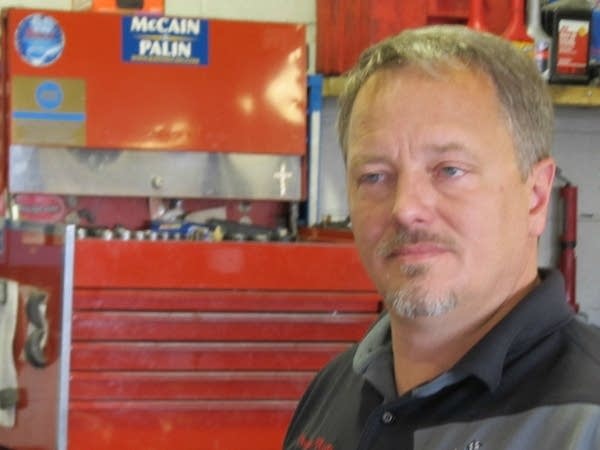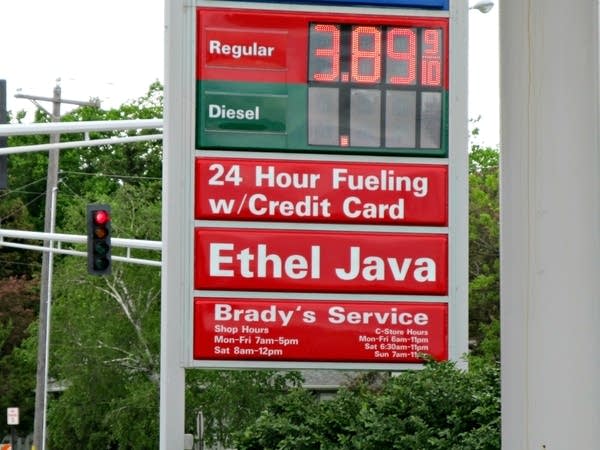Along ND border, Minn. business owners say higher taxes hurt
Go Deeper.
Create an account or log in to save stories.
Like this?
Thanks for liking this story! We have added it to a list of your favorite stories.

When service station owner Brady Olson decided politicians weren't listening to him, he took to the airwaves to protest higher taxes that he said were cutting into his profits.
"Hi, I'm Brady from Brady's Service," he said in a 30-second radio spot. "Minnesota has quietly been turning my business in to a tax collection business."
In the ad, Olson criticized state legislators for increasing property and sales taxes and raising the gasoline tax by eight cents -- all in the last three years.
Olson and other business owners in northwest Minnesota say those higher taxes make it difficult for them to compete with businesses in North Dakota, where the booming economy has allowed legislators to cut taxes.
Turn Up Your Support
MPR News helps you turn down the noise and build shared understanding. Turn up your support for this public resource and keep trusted journalism accessible to all.
With Minnesota legislators recently deciding to increase cigarette taxes by $1.60 a pack, Olson said, "Now they're in the well again."
Olson was particularly critical of the higher cigarette tax, which on July 1 will be $2.83 a pack. North Dakota's cigarette tax is 44 cents a pack.
As a result, Olson expects to lose a few customers. He said people who buy cigarettes in Fargo will likely buy gas there.
Olson said every tax increase makes it tougher for his family-owned business to compete with convenience stores a mile or two away in Fargo. He pointed to gasoline as a key example of taxes that make his profit margin smaller than that of a North Dakota business.
"Every gallon they sell they're gaining a two- or three-cent advantage," he said. "That's a huge advantage.

Olson aims to make 10 cents' profit on every gallon of gas. But the tax disparity means his gas profits are 20 or 30 percent less than those of a Fargo business. He said some Moorhead gas stations will sell gas at cost to compete with Fargo prices, but he cannot afford to do that, so his prices are often a few cents higher.
That likely costs him some sales, but he said loyal customers still buy gas, and his location just off Interstate 94 helps bring in business.
As Minnesota lawmakers struggle to pay for essential services while allowing companies to remain competitive with those in nearby low-tax states, a big question is whether such tax disparities can kill a business.
There's not much evidence to support that, said David Flynn, an economist at the University of North Dakota.
"When it makes a difference, they move or they change their business tactic," said Flynn, who has studied the border business climate. "When it doesn't make a difference they complain, but we don't see a noticeable change, a business shuttering the windows or anything of that sort."
Flynn said taxes are generally not the key factor in where business locates. As an example, he cited Minnesota's lack of a sales tax on clothing. Although North Dakota taxes clothing purchases, there are more clothing stores on the North Dakota side of the border.
"Why wouldn't they locate on the Minnesota side where they could offer a lower tax rate?" he asked. "Well, the regulatory environment can be a more important driver on the cost side than the tax difference."
In most areas of business, Flynn said, North Dakota has long had less restrictive regulation. But the key factor in the differing tax approaches of legislators in the two states is oil revenue. In recent years, proceeds from state taxes and fees on the industry flowing in to the North Dakota treasury allowed lawmakers to cut taxes by hundreds of millions of dollars.

That advantage has put pressure on Minnesota businesses and communities.
Moorhead Mayor Mark Voxland said staying competitive with North Dakota is a perennial problem.
"It's always a challenge being a city like Moorhead across from a huge economic engine like Fargo," said Voxland, who also owns an electrical contracting company. "We work very hard to have some sort of balance. We don't want the difference in tax rates to be so great that nothing could possibly happen in Moorhead."
But Voxland said Moorhead also gets help from the Legislature. The Legislature approved $1.5 million in border city credits for communities along the North Dakota-South Dakota border.
Moorhead uses its share to help companies pay workers' compensation insurance premiums and offer small incentives, like paying the sales tax on building material for new businesses.
Voxland said Minnesota has traditionally had lower property tax rates, one of the few competitive advantages over North Dakota. But that advantage might have been erased by big tax cuts enacted this year by the North Dakota Legislature.
State Rep. Paul Marquardt, DFL-Dilworth, said higher taxes in Minnesota allow legislators to make investments in public facilities and education. They also help ensure a better quality of life for residents.
Marquardt said the Legislature tries to level the playing field, especially along the North Dakota border where tax disparities are greatest, by providing border cities aid and funding programs to help their businesses offset the disadvantage posed by North Dakota's lower taxes on their competitors.
One program allows Minnesota service stations within seven miles of the state's border with North Dakota to reduce the gasoline tax, though it does not eliminate the disparity. Another caps property taxes for Minnesota border businesses.
"Is there a concern on trying to keep things competitive? Yes," Marquardt said. "But the bottom line is we're never going to be able to match the tax rates of North Dakota if we're also going to be able to provide the quality of life in terms of high education, lower property taxes, good infrastructure, that we need to provide for businesses."
The North Dakota Legislature upped the ante this year with more than a billion dollars in tax relief.




